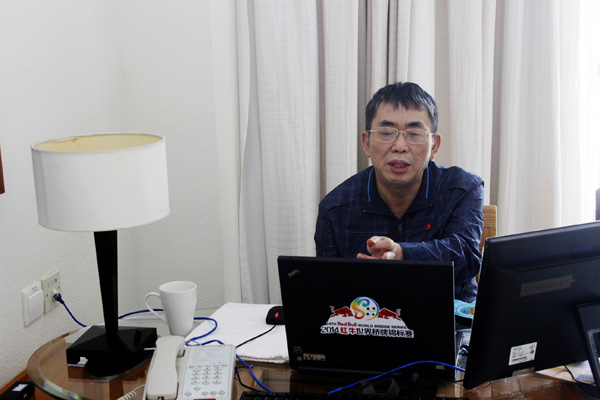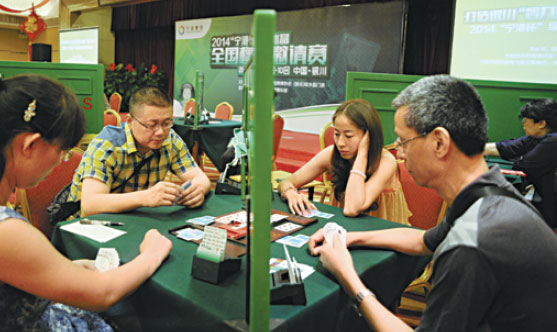Bridge enthusiasts see future in cards
By Guan Xiaomeng (China Daily) Updated: 2014-12-01 07:32Game of strategy challenges growing number of Chinese
|
 |
|
Nie Weiping is pictured during the 14th Redbull World Bridge Series in the coastal tourist city of Sanya, Hainan province October 26, 2014. [Provided for chinadaily.com.cn] |
Chinese bridge players are banking on growing national interest in one of the world's most popular card games to enable them to make their mark in the global arena.
Last month, the Chinese women's team was runner-up at the 14th Redbull World Bridge Series in the coastal tourist city of Sanya, Hainan province.
But Chinese Go chess master Nie Weiping, who is also an accomplished bridge player, said hosting world tournaments is far from enough to promote the game.
"It should be promoted among more juniors," said Nie, who began playing Go when he was 9 and took up bridge at 14.
Bridge, a trick-taking game that originated in Britain in the 17th century and has spread through the West, including the United States, since the 1890s, is now played globally in clubs, tournaments and online.
|
 |
|
Yang Qing, chairman of Ourgame |
"I love bridge because it is teamwork. You can team up with anybody. ... You discuss tactics and work together. ... It is a good way to explore your brain and make friends," said Nie. He kept TV viewers entertained with his wit and comments at the bad tricks spotted during the event, and sometimes even felt inclined to take over underperforming players' hands.
There are about 20 million Go players in China compared with the 500,000 playing bridge. Bridge has a short history in the country compared with other games, and its basics are difficult for most beginners to grasp.
The late Chinese leader Deng Xiaoping, who steered the country's reform and opening-up in the late 1970s, was known for his love for bridge. Nie has fond memories of teaming up with Deng in bridge wins over other top players and said the wit that Deng displayed in the games embodied the art of his leadership.
During its congress in June, the China Contract Bridge Association said it will focus on campus competitions, with provincial groups and college bridge leagues teaming up over the next five years to connect more people to the game.
Yang Qing, chairman of Ourgame, China's leading online bridge game developer and operator, said another way is to build the bridge games industry through the latest platforms. With high-end loyal subscribers, the PC and mobile provider aims to set up paid online and TV lessons given by masters such as Nie.
"Parents all over the country would love to see their children mentored by Mr Nie," Yang said. "And it is our job to connect elites to ordinary people to build the industry."
The Hong Kong-listed online game provider has 500 million registered subscribers, including 25 million active ones, and reported an eightfold monthly increase in mobile subscribers during the first nine months of this year.
October's event in Sanya was the first time a world bridge tournament had been held in Asia. Ourgame is considering a world mahjong tournament to be based permanently in China and a World Bridge Federation-authorized TV and online broadcast of world tournaments.
"Bridge, chess and mahjong are included in soft power, and we want to show the world our muscle," Yang said.
guanxm@chinadaily.com.cn
|
Bridge, a game that originated in Britain in the 17th century and has spread through the West, is now played globally in clubs, tournaments and online. But in China, the game is yet to be widely recognized by the public. Wang Peng / Xinhua |
(China Daily 12/01/2014 page6)









